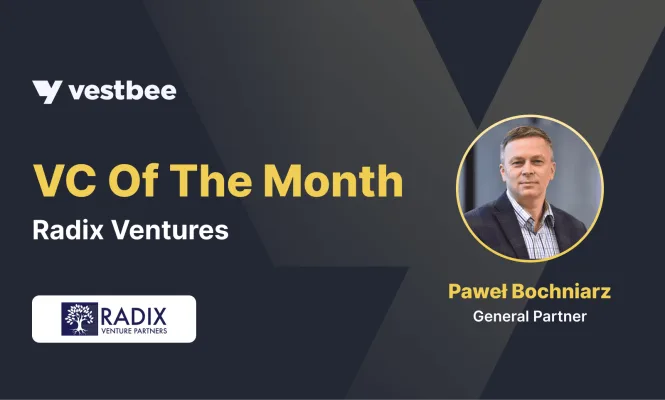Radix Ventures is a Polish venture capital fund established in 2023 by seasoned investors and tech entrepreneurs, including Paweł Bochniarz, Wojciech Ratymirski, and Michał Urbanowski. In June 2024, the fund announced the completion of its first close, raising €41 million towards a target of €60 million, aiming to back 16–20 startups across Central and Eastern Europe.
Pawel Bochniarz, General Partner at Radix Ventures, told Vestbee more about the fund’s strategy and investment approach.
Fund strategy overview
Geography: CEE
Preferred industries: deeptech with a focus on energy, transport/mobility, manufacturing, spacetech, dual use technologies, and a preference for sustainable solutions
Investment ticket: €1M-€2M
Company stage: late seed and Series A
Product type: not relevant
Product stage: not relevant
Revenues: not relevant
Q&A with Pawel Bochniarz, General Partner at Radix Ventures
What are the 5 main things you look for in a startup?
- Radical Innovation: Radix stands for Radical and we seek startups with groundbreaking, transformative technology rather than incremental improvements, especially in areas like deep tech and climate tech.
- Strong Team: A team that shows resilience, complementary skills, and a shared vision for their project is essential.
- Market Potential: We focus on sectors where there is a real necessity for innovation, such as energy, transport, dual use and manufacturing, where startups can make a significant impact. I can only reinforce what I said previously - we try to back startups, whose technology can be transformative to entire industries.
- Scalability: Startups should have a clear pathway to scale and a business model that can expand effectively.
- Alignment with Radix Values: We prioritize startups that are committed to sustainability and have the potential to contribute to economic growth in CEE through innovative solutions.
What disqualifies a startup as your potential investment target?
Most of the rejections stem from the fact that we take deep tech seriously. Often we find that under an attractive headline that uses all the catchphrases around AI, ML deep tech and all, there isn’t just that much real substance. While we do not limit ourselves to investing solely in academic spin-offs, the science or engineering behind a startup we back must be at the forefront of contemporary technology. Other reasons we could walk away from a deal are the following:
- Lack of Transparency: Trust is crucial for us. If we find that a startup isn’t fully transparent or tries to mislead us, it is a definite red flag.
- Misalignment on Values: Startups that are solely profit-driven without a consideration for environmental or social impact might not be the right fit for Radix.
- Insufficient IP Strategy: In deep tech, IP is essential. We avoid startups that have poorly developed intellectual property strategies or lack a clear understanding of their IP positioning.
What in your opinion differentiates the best founders from the rest?
I think that generally great founders have a big vision for their startup but a small ego. They’re open to feedback, quick to learn from mistakes, and always seek to improve. They also are ready to dream big and work hard to back it up. I also value resilience a lot. Founders who can persevere through challenges and maintain their dedication are those we find most compelling. Having visited Ukraine recently, I am deeply impressed by the tremendous dedication founders there exhibit, but I think this is an overall relative strength of founders in our region in comparison to W. Europe.
What startups should take into account before making a deal with a VC fund?
Startups should ensure the VC’s goals align with their long-term vision. They need to look for VCs that understand their industry and can provide relevant support. It’s also important to understand the terms related to equity and decision-making control in the deal.
What is your approach to startup valuation and preferable share in the company?
We aim for a balanced approach that reflects both the startup’s current achievements and its potential for growth. We’re less focused on immediate profits and more on long-term potential. We typically seek a share that allows us to be actively involved without stifling the startup’s growth, ensuring we can provide follow-on investments where needed. That typically means that we would like initially a share of 5-10% coming in at the late seed stage. That takes into account the fact that we would not do a round as a single investor. We look for opportunities to co-invest, either as a lead or follower.
How do you support your portfolio companies?
We actively assist our portfolio companies in securing follow-on funding and offer strategic advice during negotiations. We also leverage our international network to aid startups expand into new markets and connect them with potential clients and partners. Last but not least our network of patent attorneys and IP strategists offers portfolio companies guidance to strengthen their IP.
What are the best-performing companies in your portfolio?
Our previous fund was called Valuetech, and there our leading investments were:
- Lerta: An innovative virtual power plant operator we exited in 2022.
- Noctiluca: An advanced materials startup that IPOed in 2022.
- Nevomo: A company pioneering autonomy for railway infrastructure. Each of these companies represents our focus on radical innovation and strong market impact.
What are your notable lessons learned from investments that didn’t work out as expected?
We learned to avoid projects where pilot deployments or proofs of concept are required in remote, unfamiliar markets, as these can introduce unanticipated delays and challenges. A project in the oil & gas sector taught us to evaluate the regulatory environment thoroughly and to avoid sectors where fundraising becomes progressively harder over time.
What are the hottest markets you currently look at as VC, and where do you see the biggest hype?
There’s a growing urgency for innovations that reduce GHG emissions and improve energy efficiency, so we obviously look at cleantech and energy tech. Deep tech software is high on our list, especially in AI and machine learning applications for quality control, predictive maintenance, and process optimization.
In your view, what are the key trends that will shape the European VC scene in coming years?
It is quite obvious that with a growing emphasis on ESG, we expect a continued shift towards investments that contribute positively to the environment and society. Moreover, as Europe builds its tech ecosystem, the role of deep tech will be central, with more VCs shifting focus towards sectors like AI, quantum computing, and advanced materials.
We are very bullish on CEE, we expect the region to become a significant player in the European tech landscape.







